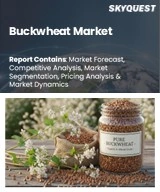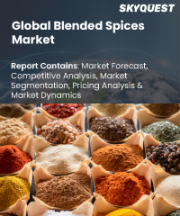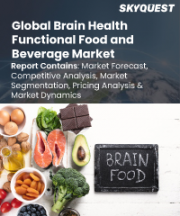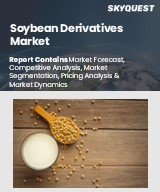
|
연간정보 서비스
상품코드
1504288
GMIPulse : 식품 및 음료 시장 인텔리전스 구독 서비스GMIPulse - Food & Beverage Market Intelligence Subscription |
||||||
Global Market Insights Inc.는 최고의 전략적 가치를 제공하도록 설계된 최첨단 비즈니스 인텔리전스(BI) 플랫폼인 GMIPulse를 제공합니다. 산업 생태계에 대한 깊은 이해를 제공하고, 고객의 고유한 니즈에 맞게 맞춤화할 수 있는 적응형 구독 서비스를 제공합니다. 이 플랫폼은 모든 시장 조사 요구 사항을 충족하고 최신 트렌드와 기술 발전의 흐름을 파악할 수 있도록 보장합니다.
GMIPulse의 장점
- 1. 정확한 시장 데이터에 대한 손쉬운 접근 : GMIPulse는 정확한 시장 데이터에 즉각적으로 접근하여 전략적 의사결정을 위한 정확한 최신 정보를 제공합니다.
- 2. 종합적인 시장 조사 솔루션 : 종합적인 시장 조사 도구로서 GMIPulse는 광범위한 산업을 포괄하고 상세한 분석 및 예측을 제공하며 시장 역학을 효과적으로 탐색합니다.
- 3. 상세한 경쟁 구도 : 경쟁 구도와 기업 프로파일에 대한 종합적인 고찰을 제공하여 경쟁사 및 업계 벤치마킹을 철저히 이해할 수 있습니다.
- 4. 산업 생태계 이해 : GMIPulse는 산업 생태계를 깊이 이해하고 기술 발전과 산업 동향에 미치는 영향을 추적합니다.
- 5. 맞춤형 고객 프로파일 : 맞춤형 고객 프로파일을 통해 최신 성장 기회를 파악하고, 특정 시장 니즈를 이해하며, 전략 수립을 강화할 수 있습니다.
- 6. 기술 동향 추적: 최신 기술 동향과 시장에 미치는 영향을 파악하여 향후 전개에 대비합니다.
- 7. 최신 보고서에 대한 액세스 : 가입자는 과거에 발표된 보고서와 향후 발표 예정인 보고서에 액세스하여 항상 최신 시장 정보를 얻을 수 있습니다.
- 8. 인터랙티브하고 사용하기 쉬운 인터페이스 : 본 플랫폼의 인터랙티브 인터페이스는 원활한 사용자 경험을 보장합니다.
- 9. 애널리스트와의 충분한 면담 시간: 애널리스트의 전략적 지원과 상세한 설명에 대한 접근성이 향상되어 정보에 입각한 의사결정을 내릴 수 있습니다.
- 10. 보안 로그인 : 비밀번호로 보호되는 모든 보고서에 대한 액세스를 즐길 수 있습니다.
GMIPulse의 뛰어난 이점
- 1. 보고서에 즉시 액세스 : GMIPulse는 고객에게 종합적인 시장 보고서에 대한 직접 액세스를 즉시 제공하여 적시에 충분한 정보를 기반으로 의사 결정을 촉진합니다.
- 2. PulseAI, GMI Pulse 내 PulseAI Assistance 도입 : 데이터에 대한 통찰력을 모든 언어로 누구나 접근할 수 있도록 하는 획기적인 기능입니다. 다국어 지원을 통해 PulseAI는 복잡한 보고서를 매끄럽게 번역하고 질문에 실시간으로 답변합니다.
- 3. 인터랙티브 대시보드: 지역이나 세그먼트 등에서 쉽게 데이터를 필터링할 수 있기 때문에 가장 중요한 것에 집중할 수 있습니다. 간단한 인터페이스를 통해 기술적인 기술 없이도 조정을 할 수 있으며, 실시간 업데이트를 통해 작업 중에 살아있는 통찰을 얻을 수 있습니다.
- 4. 맞춤형 보고서 : 업계 리더가 고객의 요구에 맞게 사용자 정의 한 시장 동향, 기술 개발 및 혁신에 대한 자세한 내용에 대한 보고서에 액세스할 수 있습니다.
- 5. 우선순위 영업 지원: 동급 최고의 영업 지원 및 지원을 신속하게 제공하여 고객 서비스 경험을 향상시킵니다.
- 6. 마켓트래커 : 모든 시장 동향과 사건에 대한 효율적인 액세스를 통해 최신 정보를 지속적으로 얻고 전략적 계획과 의사 결정을 내릴 수 있습니다.
- 7. 가격면의 장점 : 종합적이고 비용 효율적이며 고객의 예산과 요구에 맞는 보고서를 제공합니다.

산업 포커스 : 식품 및 음료
소비자 선호도 변화, 기술 발전 및 규제 발전으로 인해 식품 및 음료 산업은 끊임없이 진화하고 있으며, GMIPulse는 식품 및 음료 산업의 주요 클러스터에 대한 심층적인 통찰력을 제공합니다.
음료
세계 음료 시장은 2023년부터 2030년까지 연평균 5.3% 성장할 것으로 예상되며, 건강 지향적 제품과 혁신적인 맛에 대한 소비자 수요 증가가 그 원동력이 될 것으로 보입니다. 주요 시장에는 무알콜 음료, 알코올 음료, 기능성 음료가 포함됩니다. 예를 들어, 에너지 음료와 강화수를 포함한 기능성 음료 시장은 건강상의 이점으로 인해 인기를 끌고 있습니다.
식품 첨가물
식품 첨가물 시장은 가공식품 수요 증가와 식품 안전 및 보존성 강화 요구로 인해 2023년부터 2030년까지 6.1%의 연평균 복합 성장률(CAGR)을 나타낼 전망입니다. 주요 부문에는 방부제, 향미증진제, 착색제 등이 포함됩니다. 스테비아와 몽크푸르트와 같은 천연 첨가물은 소비자들이 합성 첨가물을 대체할 수 있는 건강한 대안을 찾으면서 인기가 높아지고 있습니다.
식품 가공
세계 식품 가공 시장은 가공 기술 발전과 인스턴트 식품에 대한 수요 증가로 인해 2023년부터 2030년까지 연평균 4.8%의 성장률을 보일 것으로 예상됩니다. 주요 분야로는 육류 가공, 유제품 가공, 베이커리 제품 및 제과 가공 등이 있습니다. 식품 가공에 자동화와 AI를 도입하여 효율성과 제품 품질을 향상시키고 있습니다.
푸드서비스
외식 트렌드 확대와 음식 배달 서비스의 인기 상승에 힘입어 외식 시장은 2023년부터 2030년까지 연평균 5.5%의 성장률을 나타낼 것으로 예상됩니다. 주요 부문으로는 레스토랑, 카페, 케이터링 서비스 등이 있습니다. 온라인 음식 배달 플랫폼과 고스트 키친의 등장은 외식 산업에 변화를 가져오고 있습니다.
식품 검사
식품 검사 시장은 엄격한 식품 안전 규제와 식중독 증가로 인해 2023년부터 2030년까지 7.2%의 연평균 복합 성장률(CAGR)을 나타낼 전망입니다. 주요 분야로는 미생물 검사, 화학 검사, 영양 라벨링 등이 있습니다. 신속 검출법, 추적성을 위한 블록체인과 같은 검사 기술 혁신은 식품 안전과 품질 보증을 강화하는 데 기여하고 있습니다.
영양보조식품
건강과 웰빙에 대한 소비자의 인식이 높아짐에 따라 건강보조식품(Nutraceuticals) 시장은 2023년부터 2030년까지 연평균 8.4%의 견조한 성장세를 보일 것으로 예상됩니다. 주요 부문으로는 건강보조식품, 기능성 식품, 기능성 음료가 있습니다. 프로바이오틱스, 오메가3 지방산, 식물성 단백질에 대한 수요는 기본적인 영양을 넘어 건강상의 이점을 제공하는 제품을 찾는 소비자들로 인해 급증하고 있습니다.
가공식품
세계 가공식품 시장은 소비자의 바쁜 라이프스타일과 RTE 식품의 인기 증가로 인해 2023년부터 2030년까지 4.9%의 연평균 복합 성장률(CAGR)을 나타낼 전망입니다. 주요 시장에는 냉동식품, 통조림 식품, 스낵류가 포함됩니다. 클린 라벨 제품 및 천연 성분에 대한 수요는 더 건강한 가공식품의 개발에 영향을 미치고 있습니다.
단백질
단백질 시장은 고단백 식단에 대한 수요 증가와 스포츠 영양 분야의 성장에 힘입어 2023년부터 2030년까지 연평균 6.7%의 성장률을 나타낼 것으로 예상됩니다. 주요 부문에는 동물성 단백질, 식물성 단백질, 곤충 단백질이 포함됩니다. 완두콩 단백질과 콩 단백질과 같은 식물성 단백질은 환경적 이점과 건강상의 이점으로 인해 인기를 얻고 있습니다.
GMIPulse는 BI 지원 플랫폼을 통해 타의 추종을 불허하는 전략적 가치를 제공합니다. GMIPulse는 맞춤형 대화형 인터페이스, 정확한 데이터, 종합적인 시장 고려 사항을 통해 경쟁이 치열한 식품 및 음료 시장에서 한 발 앞서 나갈 수 있는 필수적인 도구입니다. 도구입니다. 지금 바로 가입하여 시장 조사 및 전략 수립 능력의 잠재력을 극대화할 수 있습니다.
LSH 24.07.23Global Market Insights Inc. offers GMIPulse, a cutting-edge, Business Intelligence (BI)-enabled platform designed to deliver the finest strategic value. GMIPulse offers an adaptable subscription service, customizable to meet your unique needs, providing comprehensive and granular market data, competitive landscape insights, and an in-depth understanding of industry ecosystems. This platform is your go-to solution for all market research needs, ensuring you stay ahead with the latest trends and technological advancements.
Advantages of GMIPulse
- 1. Easy Access to Accurate Market Data: GMIPulse provides instant access to granular and authentic market data, empowering you with precise and up-to-date information for strategic decision-making.
- 2. Comprehensive Market Research Solution: As your all-encompassing market research tool, GMIPulse covers a wide array of industries, offering detailed analyses and forecasts to help you navigate market dynamics effectively.
- 3. In-Depth Competitive Landscape: The platform offers comprehensive insights into competitive landscapes and company profiles, enabling you to understand your competitors and industry benchmarks thoroughly.
- 4. Understanding Industry Ecosystems: GMIPulse allows you to gain a profound understanding of industry ecosystems, tracking technological advancements and their impact on industry trends.
- 5. Customized Client Profiles: Tailor-made client profiles help you identify the latest growth opportunities and understand specific market needs, enhancing your strategic planning.
- 6. Technology Tracking Stay informed about the latest technological trends and their implications on the market, ensuring you are well-prepared for future developments.
- 7. Access to Latest Reports: Subscribers receive access to previously published reports and upcoming releases, keeping you updated with the most recent market intelligence.
- 8. Interactive and User-Friendly Interface: The platform's interactive interface ensures a seamless user experience, allowing you to navigate through data effortlessly and derive meaningful insights efficiently.
- 9. Enhanced Analyst Hours: Benefit from improved access to analysts for strategic assistance and in-depth explanations, ensuring you make well-informed decisions.
- 10. Secure Login: Enjoy password-protected access to all reports, ensuring your data security and confidentiality.
Exceptional Benefits of GMIPulse
- 1. Instant Report Access GMIPulse offers clients direct access to comprehensive market reports instantly, facilitating timely and informed decision-making.
- 2. PulseAI, Introducing PulseAI Assistance within GMI Pulse: a game-changing feature that makes data insights accessible to everyone, in any language. With multilingual support, PulseAI seamlessly translates complex reports and answers your questions in real-time, breaking down language barriers for effortless, intuitive data exploration.
- 3. Interactive Dashboard We're excited to announce that the Interactive Dashboard is now available to all GMI Pulse users, changing the way you interact with your data. With easy data filtering by region, segment, and more, you can focus on what matters most. The simple interface lets you make adjustments without technical skills, and real-time updates provide live insights as you work.
- 4. Tailor-Made Reports Access customized reports detailing market trends, technological developments, and innovations by industry leaders, tailored to your specific needs.
- 5. Priority Sales Support Receive best-in-class sales support and assistance promptly, enhancing your customer service experience.
- 6. Market Tracker Stay updated with streamlined access to all market trends and happenings, aiding in strategic planning and decision-making.
- 7. Pricing Benefits Obtain reports that are not only comprehensive but also cost-effective, tailored to fit your budget and needs.
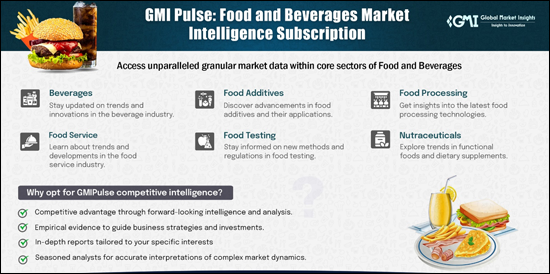
Industry Focus: Food & Beverage
The food & beverage industry is continuously evolving, driven by changing consumer preferences, technological advancements, and regulatory developments. GMIPulse provides in-depth insights into the following key clusters within the food & beverage industry:
Beverages
The global beverages market is one of the strongest and most varied consumer industries that includes both alcoholic and non-alcoholic markets which together respond to changing consumer behavior, health awareness, and lifestyle shifts. The drinks industry is undergoing dramatic change fueled by demand for premium products, health-oriented formulations, and new flavor profiles in established and fast-emerging categories.
Based on green bean equivalents, coffee consumption in 2023 was about 91,000 tons according to the Coffee Board of India. The growth was mainly driven by increased at home consumption, expanding instant coffee penetration, and increasing out-of-home cafe consumption throughout the country.
The alcoholic beverages category shows strong market visibility, with the size of the global canned alcoholic drinks market at USD 71.2 billion in 2024 and expected to increase at a rate of more than 13.2% CAGR from 2025 to 2034. This is backed by premiumization, craft drinks trends, and widening market access via digital platforms. The non-alcoholic beverages market is growing even faster with the Non-Alcoholic Beer Market size value of USD 22 billion in 2022, with an expected 5.5% CAGR during 2032.
There are major market drivers for beverage alcohol or near-beverage alcohol when looking at the central market including, growing awareness of health issues, disposable income, rapidly changing demographics, and high interest from younger consumers in "sober curious" coding.Along with product innovation around functional beverage product development, sustainability in packaging, and personalized nutrition, all navigating the new landscape of product development. The convergence of plant-based ingredients, wellness trends, and low alcohol options are periodically re-energizing alcoholic and non-alcoholic manufacturers and consumers.
Food Additives Market Category Description
The food additives market is undergoing radical growth underpinned by consumers' evolving preference for clean-label solutions and sustainable ingredients. Based on the ingredient, 49-67 percent of consumers expressed willingness to try food and beverages with novel ingredients, with consumers willing to try novel ingredients in snacks and at lunch most. Labels that use language familiar to consumers and that provide easily understandable claims about health effects most effectively encourage trial of food products with novel ingredients.
The global market for food additives represents a huge industry with continued growth - across many different product categories. The total size of the food additives market was over USD 124.2 billion in 2024 and is expected to grow at 10.1% CAGR from 2025-2034 partly due to a growing consumer preoccupation with clean labelled products. Clean-labeling trends in consumers are reshaping market drivers. The clean labelled food additives market was worth USD 45.3 billion in 2024 and expected to grow at a CAGR of 5.8% from 2025 to 2034 as more consumers become aware of consuming food that is natural, open, and healthy.
Specialty additive segments highlight focused growth opportunities fueled by health awareness and compliance. Flavor enhancers are a key segment, with the market size of food flavors & enhancers reaching over USD 8.73 billion in 2023 and anticipated to register a 6.2% CAGR from 2024 to 2032 due to rising need for natural flavors and enhancers. Food colorings are aided by natural substitutes, with the annatto food colors market value reaching more than USD 210.4 million in 2023 and anticipated to record a 5.9% CAGR during the period between 2024 and 2032, as a result of increasing awareness regarding health hazards posed by artificial additives. The intersection of consumer desire for transparency and biotechnology innovation is leading to new opportunities in antioxidants, preservatives, sweeteners, and texturizers and thickeners and tunities while conventional chemical-based additives are increasingly coming under scrutiny and pressure from natural substitutes.
Food Processing
The food processing market is a pillar of the global food economy, witnessing unparalleled growth due to urbanization, shifting lifestyles among consumers, and technological advancements transforming the production capacity and efficiency of operations. As cited by the USDA, Brazil's food processing industry recorded USD 233 billion in revenue in 2024, which was a 9.9% increase from 2023. This sector contributed 10.8% to the national GDP. It is clear from the growth of the industry that it is most important position to serve the increasing worldwide food requirements, while meeting safety, efficiency, and sustainability expectations.
Industrial food processor market size stood at USD 64.1 billion in 2023 and is expected to record more than 4.5% CAGR from 2024 to 2032, driven by growing investments in the food and beverage industry and embracing cutting-edge processing technology. The industry incorporates a variety of processing sectors, with the processed fruits and vegetables sector worth USD 377.3 billion in 2024 and forecasted to reach USD 698.6 billion by 2034 at a CAGR of over 6.3%, and the fermented processed foods sector exceeded USD 109.58 billion in 2023, forecasted to show a +6.6% CAGR during the 2022-'32 period.
Automation and digitalization are changing how many of the industry's processes are applied, and the food robotics segment had a market size of USD 3.2 billion in 2022, hypothesized to realize at least 12% CAGR over the 2022-'32 period, due to labour shortages, and the food technology segment had a market size of USD 210.9 billion in 2024, forecasted to experience 8.2% CAGR during 2025-2034, due to plant-based alternatives and clean-label ingredients as well as IoT-enabled processing technologies. Leading market drivers include stringent food safety regulations, sustainability corroborated by the raising disposable incomes, increasing consumer demand for convenience foods, and technological advances in automation, artificial intelligence, and intelligent manufacturing systems applied to enhance productivity while limiting the environmental impacts.
Food Service
The global food service market is among the most diverse and widespread categories of the food market, covering various channels of service ranging from full-service restaurants to food service in institutions, quick-service restaurants, and rising delivery platforms. Based on the National Restaurant Association, the foodservice industry is expected to reach $1.5 trillion in sales by 2025. In addition, a large majority of consumers indicate that they would like to eat out more frequently if the price were right. Robust growth arises from the ongoing urbanization of population, operating technologies, and consumers with increasing demands for convenience dining options from numerous demographic groups and locations.
Technology integration will continue to affect operational efficiency, and the food service packaging market will also play an important supportive role. The food service packaging market was valued at over USD 131.48 billion in 2023 and is projected to register 4.9% CAGR growth from 2024 to 2032 due to increasing convenience food demand.
The industry also has specialized segments, such as the airport quick service restaurant industry, with a size of USD 36.8 billion in 2024, which is projected to grow at a rate of over 4.5% during 2025-2034, fueled by increasing passenger traffic at airports.
Key market drivers are changing consumer lifestyles, digitalization through mobile ordering and delivery platforms, hospitality sectors' post-pandemic recovery, and growing demand for bespoke dining experiences. Sustainability initiatives, contactless service initiatives, and ghost kitchen concepts continue to transform industry operations and consumer engagement strategies across all food service channels.
Food Testing
The global food testing market plays an important role in public health and food safety, continuing to grow rapidly due to increases in foodborne illness outbreaks, continued regulatory burdens, and increased knowledge of food quality and contamination risks, leading to an increase in consumer demand. According to the Journal of Food: Microbiology, Safety & Hygiene, the food testing market worldwide will grow at a CAGR of 7.7% and amount to $24.6 billion by 2026. An increase in foodborne outbreaks and increasing consumer pressure for safe and healthy food items are driving the growth of the market.
The food testing industry includes in-depth analysis of various contamination sources, with specialized segments registering incredible growth. The size of the food pathogen testing market was more than USD 5 billion in 2022 and is expected to grow at over 7.5% CAGR during the forecast period of 2023-2032, owing to growing foodborne disease outbreaks globally. The sector is also aided by underlying technologies, with the microbiology testing market being worth USD 4.9 billion in 2022 and expected to grow to more than USD 11.9 billion by 2032 as a result of the rising incidence of infectious diseases and pandemic outbreaks.
Drivers of the market are strict regulatory guidelines imposed by the FDA, FAO, and EU regulators, growing worldwide processed meat and dairy consumption, and growing vegetable consumption necessitating contamination monitoring. Technological innovation in quick testing technologies, AI-driven detection devices, and automatic laboratory instruments is transforming the efficiency and accuracy of testing. The industry is hampered by infrastructure constraints in developing countries, but is sustained by government policies aimed at regulating food quality and increasing media coverage of contamination-borne diseases, driving demand for full-range food tests across all food segments.
Nutraceuticals Market Category Description
The nutraceuticals market is a dynamic convergence of nutrition and pharmaceuticals, fueled by the globalization of preventive healthcare and wellness-oriented lifestyles. As per ScienceDirect, the market for nutraceuticals is a high-value, multi-billion-dollar one that is bound for robust and fast growth in the next decade driven by the growing incidence of metabolic disorders. The vast and expansive marketplace has key areas which include amino acids, herbal supplements, omega-3 fatty acids, protein supplements and vitamins that satisfy niche consumer health needs and demographic imperatives.
Protein supplements are market leaders because awareness of fitness and sports nutrition for Gen Z and millennial consumers increased. The amino acids category is also continuing to grow rapidly, as demand rises from fitness fans and athletes seeking better performance and recovery strategies.
Herbal supplements are making tremendous headway as consumers increasingly prefer natural, plant-based solutions to synthetic ones, backed by growing evidence in support of traditional medical practices. The vitamins category continues to be core with steady demand for immune and specific nutrient deficiency treatments.
Rising niche markets also reflect the industry's fast growth. The seaweed extracts industry grew to USD 1.7 billion in 2024 with its increasing application in dietary supplements, functional foods, and gut health products. At the same time, the postnatal probiotic supplements industry was worth USD 5.3 billion in 2024 and is projected to grow to USD 11.5 billion by 2034 with a CAGR of 8.1%, led by rising awareness of infant and maternal health.
Market driving factors generally include: aging population, rising health care costs, trends toward personalized nutrition, and consumers' awareness of the role of nutrition for disease prevention. Product access and consumer experience will continue to change across all nutraceutical subsegments through direct-to-consumer and digital health integration.
Processed Food
The processed food industry is one of the largest segments in the food industry on a global scale, with stable growth characterized by urbanization, shift in lifestyles among consumers, and food manufacturing technology advancements. The Agricultural and Processed Food Products Export Development Authority (APEDA) stated that the exports of processed foods from India in the 2023-24 fiscal year amounted to USD 7,701.66 million. This large market includes varied subcategories, ranging from baking foods, convenience foods, fresh fruits and vegetables, to processing equipment, each segmenting unique consumer demands and operational needs along the food value chain.
The bakery products segment has a steady presence in the market, with technology advancing efficiency and product development. The market for bakery processing equipment sized USD 11.1 billion in 2023 and is expected to grow at a CAGR of 8.5% during 2032, representing growing automation and energy-efficient processing technology. Convenience foods continue to witness a remarkable growth rate as active lifestyles fuel demand for ready-to-consume and simple preparation foods supported by advances in packaging and preservation technologies.
The processing equipment category is the industry's technological foundation. The world food processing equipment market size was USD 48.1 billion in 2024 and is projected to expand at a CAGR of 4.8% during 2034. Fresh vegetable processing is an important emerging area, supported by health awareness and need for minimally processed, nutritionally retained products. Key drivers of the market include an increase in labor cost, sustainability initiatives, automation adoption, and shifting consumer preferences toward less unhealthy processed foods. Digitalization, manufacturing intelligence technologies, and green package solutions are transforming operational effectiveness and sustainability in every subcategory of processed foods.
Proteins
The global proteins market is a basic pillar of food security and nutrition, undergoing dynamic change fueled by changing consumer trends, concerns about sustainability, and technological advances in conventional and new protein sources. The global market for alternative meats, eggs, dairy, and seafood is projected to reach at least USD 290 billion by 2035, driven by surging global consumer demand for plant-based, microorganism-based and cell-based protein alternatives. This large market represents various protein groups, such as alternative proteins, animal proteins, and plant proteins, each serving different nutritional requirements, environmental aspects, and lifestyle preferences of consumers.
The segment of alternative proteins is witnessing phenomenal growth with the market worth USD 79.7 billion in 2023 growing at a rate of 11% CAGR during 2024-2032 on account of environmental, health, and ethics. This expansion is a result of growing consumer knowledge on the environmental effects of traditional livestock production and preference for more environmentally friendly protein sources. Animal proteins continue to be an important market, backed by the economic size of the animal feed protein market at USD 309 billion in 2023, projected to grow at 4.9% CAGR from 2024 to 2032, due to increasing demand for high-quality meat, dairy, and egg, as consumers are looking for protein-rich diets.
Plant proteins are capturing tremendous momentum as consumers become more and more vegetarian, vegan, and flexitarian in their diets, driven by advances in processing technologies and enhanced taste profiles. Major drivers of the market are growing health awareness, environmental sustainability, innovation in protein extraction and processing, and regulatory promotion of alternative protein development. The overlap between precision fermentation, cellular agriculture, and new protein sources continues to reshape the marketplace in all food protein subcategories.
GMIPulse offers unparalleled strategic value through its BI-enabled platform. With its customizable and interactive interface, accurate data, and comprehensive market insights, GMIPulse is your essential tool for staying ahead in the competitive food & beverage market landscape. Subscribe today to unlock the full potential of your market research and strategic planning capabilities.
(주말 및 공휴일 제외)









